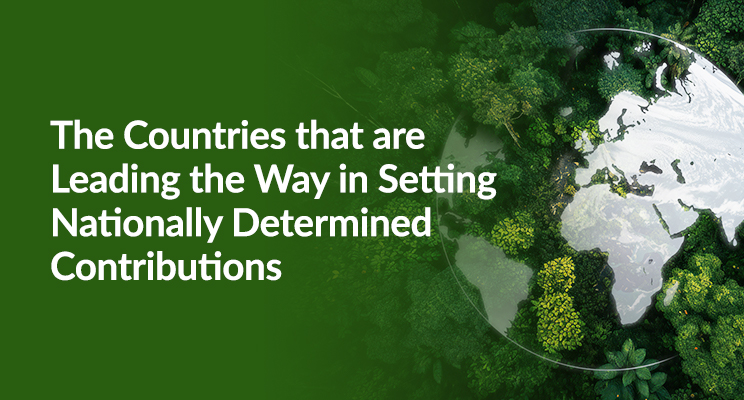Nationally Determined Contributions (NDC) are essential climate action plans established under the Paris Agreement. They detail countries’ commitments to cut emissions and adapt to climate change’s impacts. Their primary goal is to keep global warming within 1.5°C, providing a framework for accountability, collaboration, and advancement in global climate initiatives.
Every participating nation has submitted its NDC, showcasing a range of ambitions and challenges. While some countries set ambitious targets for renewable energy and carbon neutrality, others grapple with resource constraints and vulnerabilities.
What are NDCs?
Nationally Determined Contributions (NDCs) are climate action plans established under the Paris Agreement, which 196 parties have endorsed. The initial update occurred in 2020, with the next renewal deadline scheduled for February 2025, targeting goals for 2035.
NDCs concentrate on two main areas:
1). Mitigation: Reducing greenhouse gas emissions through renewable energy, energy efficiency, and forest growth.
2). Adaptation: Enhancing climate resilience via coastal protection and drought-resistant agriculture.
NDCs are revised every five years to reflect growing ambitions, advancements in science, and progress achieved. They allow countries the flexibility to set targets that align with their resources and specific situations while also stressing the importance of transparency and accountability through regular reporting.
In essence, NDCs strive to synchronise global efforts towards a low-carbon, climate-resilient future, balancing national priorities with international goals.
Countries with NDC Ambitions
Under the Paris Agreement, 196 parties, which include 195 countries and the European Union, have put forward their Nationally Determined Contributions (NDCs) that detail their commitments to address climate change. Although all countries are involved, the ambition levels, focus areas, and challenges differ based on their economic conditions, available resources, and national priorities. In this context, we will examine the NDC commitments of the United Kingdom (UK), Brazil, and the United Arab Emirates (UAE)—nations that are influencing climate action in unique ways.
United Kingdom (UK)
The UK is setting ambitious targets to align with its goal of achieving net-zero emissions by 2050, with ambitious targets set for the country’s 2035 Nationally Determined Contribution (NDC) to reduce all greenhouse gas (GHG) emissions by at least 81% compared to 1990 levels. This goal aligns with the worldwide effort to limit global warming to 1.5°C above pre-industrial levels. The Prime Minister emphasised the UK’s leadership in climate initiatives, noting significant progress toward decarbonisation through a robust clean energy transition and the decarbonisation of various sectors. He also reaffirmed the UK’s commitment to achieving net-zero emissions by 2050, under the Paris Agreement.
Brazil
As the host country of COP30 in 2025, Brazil announced its 2035 target at COP29, aiming to reduce emissions by 67% from 2005 levels, thereby positioning itself as a significant player in the fight against climate change. Vice President Geraldo Alkmin, stressed that while the target is ambitious, it is entirely achievable, given Brazil’s vast potential for renewable energy and its ongoing shift towards cleaner energy sources. He acknowledged that achieving this goal will require significant national investments, infrastructure upgrades, and international cooperation.
United Arab Emirates (UAE)
The UAE, which hosted COP28 in 2023, made a notable commitment at COP29 by announcing its 2035 NDC target to cut emissions by 47% from the 2019 baseline. This ambitious target is part of the UAE’s broader climate strategy, substantial investments in renewable energy and a shift towards a diversified, low-carbon economy.
At COP29, the UAE’s announcement was part of a joint statement from several countries, including Canada, Norway, Mexico, Switzerland, Chile, Georgia, and the European Union.
These nations collectively pledged to submit NDCs that align with the emissions reduction pathways recommended by the Intergovernmental Panel on Climate Change (IPCC), aiming to keep global warming within the 1.5°C target.
Why Do NDCs Matter?
Nationally Determined Contributions (NDCs) are essential for achieving the global climate objectives outlined in the Paris Agreement, serving as a roadmap towards a sustainable and resilient future. They promote accountability and transparency, enabling countries to share their climate action plans and track progress on emission reductions and adaptation efforts.
Accountability and Transparency
NDCs hold countries accountable for their climate action commitments. By publishing their plans, countries demonstrate their progress toward reducing emissions and adapting to climate impacts.
Collective Action and Mitigating Global Risks
The NDCs of individual nations are part of a global effort to limit global warming to well below 2°C and ideally to 1.5°C. As climate-related disasters like wildfires, floods, and heatwaves increase, NDCs reduce emissions and promote climate adaptation strategies to stabilise the climate and ensure a sustainable future.
Strengthening Climate Resilience
NDCs help ecosystems, economies, and vulnerable communities adapt to extreme weather events, rising sea levels, and agricultural disruptions. They also foster ongoing ambition, with countries updating their NDCs every five years to increase their climate action, contributing to a global cycle of heightened ambition toward a low-carbon, climate-resilient future.
Driving Innovation and Economic Opportunities
By committing to emissions reductions and greater use of renewable energy, NDCs encourage investment in clean technologies, green industries, and sustainable practices. This drives innovation and creates new economic opportunities as countries transition to a green economy.
Mobilising Climate Finance
The Paris Agreement emphasises that developed nations should provide financial assistance to developing countries for emissions reductions and climate adaptation. NDCs are a key tool for expressing climate finance needs, helping to direct financial resources where they are most needed.
NDCs play a vital role in strengthening global climate resilience. They assist ecosystems, economies, and at-risk communities in adapting to extreme weather, rising sea levels, and disruptions in agriculture. Additionally, NDCs foster a cycle of heightened ambition, as countries must revise their contributions every five years following the Paris Agreement, with each update striving for a more significant impact. This continuous effort guarantees ongoing advancement toward a low-carbon, climate-resilient future.
However, developing countries face significant obstacles in effectively implementing their NDCs. These challenges include:
- Financial Limitations – Bangladesh struggles to finance climate adaptation projects despite high vulnerability.
- Technological Barriers – Uganda faces challenges in integrating renewable energy technologies.
- Institutional Constraints – Haiti lacks the institutional capacity for effective environmental governance.
- Dependence on External Assistance – Nepal depends heavily on donor funding for climate programs.
- Political Instability and Governance Issues – Sudan struggles with policy continuity due to instability.
- Inadequate Data Systems – Myanmar lacks robust systems for tracking greenhouse gas emissions.
This perspective aligns with the discussions held at global climate forums like COP conferences and reflects the realities faced by these countries. By addressing these barriers, developing nations can more effectively meet their NDC commitments, contributing meaningfully to global climate action.


